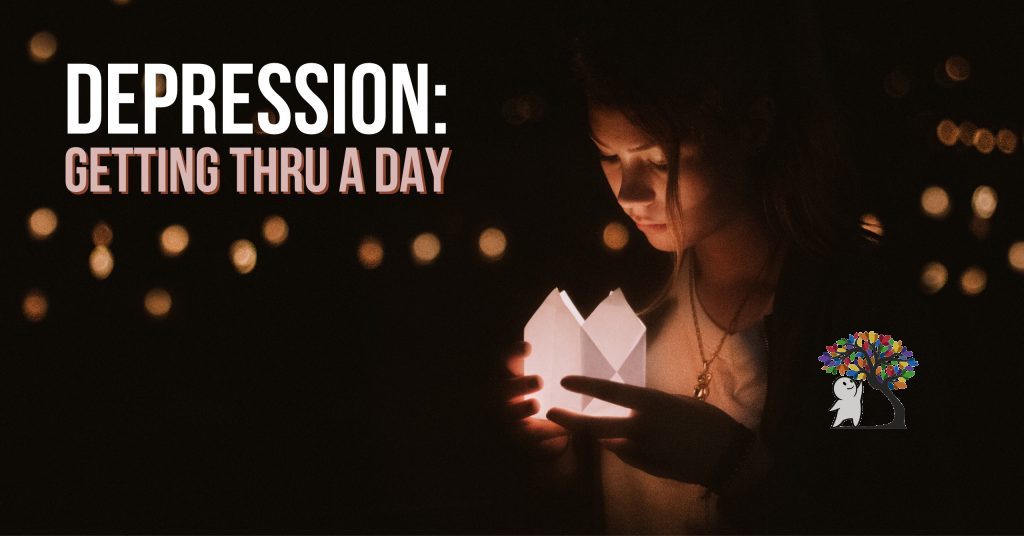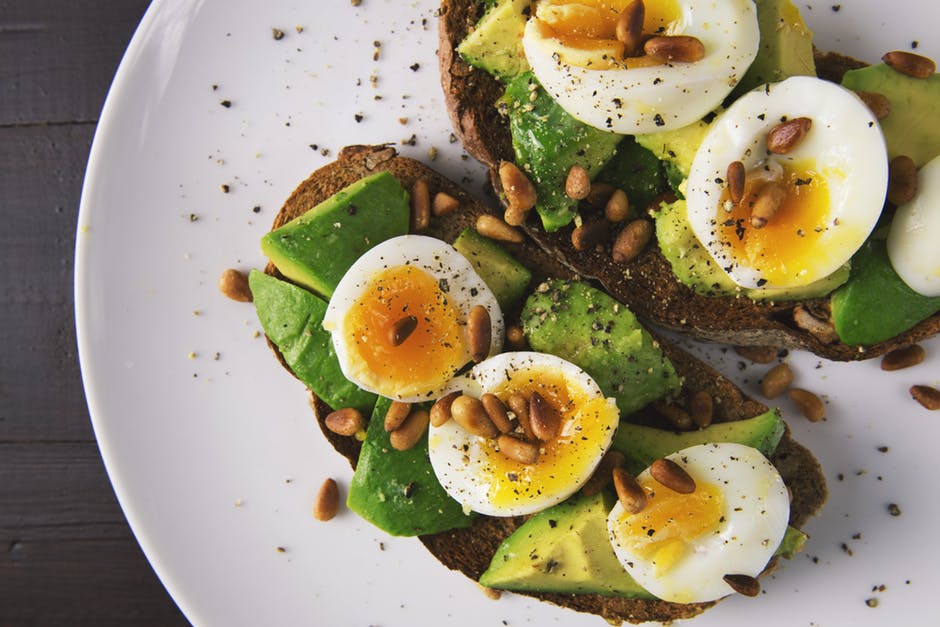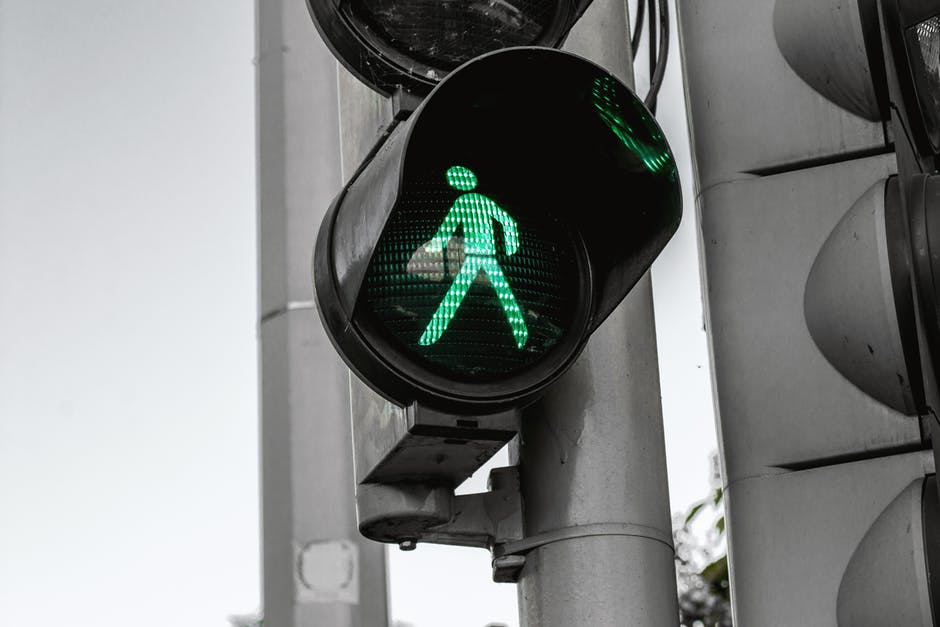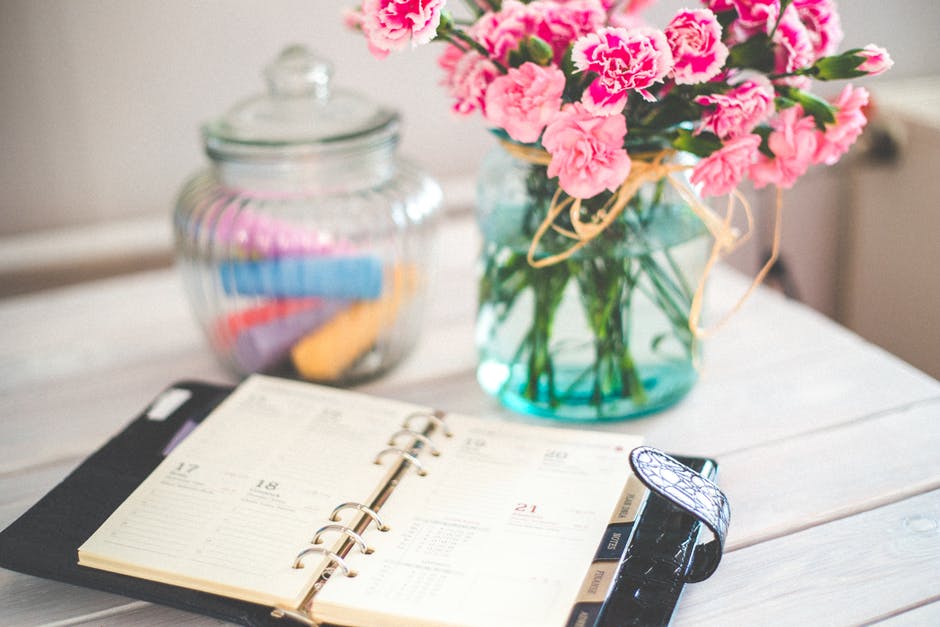10 Ways to Get Through the Day When You’re Depressed

When depression strikes, it takes a huge toll on you. You might find that you don’t want to get out of bed or have any patience to deal with the world. You also express apathy towards the things that used to motivate or make you happy. And yet, despite feeling like your life is stuck in reverse, you’re still aware that “the show must go on.” Psych2Go shares with you 10 ways to get through the day when you’re depressed:

1. Stay clean.
You might have no motivation to take care of your personal hygiene, but cleaning yourself will make you feel refreshed. If standing in the shower seems too much, you can always opt to soak in a warm bath. Washing your hair will also make your head feel lighter from the oils that build up and brushing your teeth empties your mouth of bacteria that may cause bigger problems in the future that make you feel even worse.

2. Put on clothes that make you feel good about yourself.
Wear something that makes you feel confident in your own skin, whether that translates to loose and comfortable, or something more done-up and professional —whichever style that that allows you to feel most comfortable in your own skin. Avoid anything too itchy or restricting. When you can move more easily in the clothes that you wear, they encourage you to move along, too.

3. Stay hydrated and eat healthy.
If you find your appetite has decreased from feeling depressed, at least eat some light healthy snacks. Some energy is better than no energy at all. When your body is deprived of nutrition, it’ll only shut down even further. Drinking plenty of fluids and eating well can help boost your mood. For example, although it might feel great getting immediate energy from junk food, sweets, and soda, once the rush you feel in your bloodline crashes, it will cause you to feel even more sluggish and lethargic throughout the day. Swap your sweet drinks for water and a box of Oreos for some fresh fruit. Eating more fresh, natural foods instead of processed foods will also help you digest better and this especially works in your favor, too, if you consider yourself a highly sensitive person (HSP), because you may have a more sensitive digestive tract. In fact, eating an unhealthy diet can put you at a greater risk of depression. Studies have shown that the gut microbiome interacts with and is affected by environmental risk factors, such as diet and stress. When it’s not being efficiently taken care of, this in turn, can influence one to develop mood disorders.

4. Let fresh air into your home and go out for a walk.
Crack open a window to get rid of the stale air inside that makes you feel stagnant. Go out for a walk as well and be with nature. It’s therapeutic and wakes your brain up, making you feel rejuvenated. If it’s not too hot or cold, feel free to take your shoes off as well and walk barefoot on the ground. This will heighten your senses and make you feel even closer to nature. Touch is a powerful tool, especially in times when you feel troubled and are seeking for some solace. It will also help you focus and stay in the present better without averting your attention to your problems.

5. Journal before you go to bed.
This helps you put your thoughts down instead of letting them hang over your head the next morning. Depression feels heavy, so when you’re able to let go of some of the emotional baggage that’s still festering up inside of you, you’re releasing a lot of that negativity and turning it into a productive project.

6. Let your friends, family, or someone you trust know how you feel.
Tell them that you might need time to get yourself back together again. That way, they can give you space while still acting as a support system you can lean on. Just knowing that there are people you can count on can motivate you to find something worth holding onto that keeps you going.

7. Plan your tasks in small increments rather than trying to do everything all at once.
Create a to-do list and map out your tasks you need to complete for the day. Make sure that they’re all evenly spaced out as much as possible so that you don’t feel overwhelmed trying to multi-task. Chunking is an effective way to break up a busy day into healthy increments that seems less daunting and easier to tackle. Even if you aren’t able to get through your entire list of tasks, know that any amount of work you put in for the day is an accomplishment in itself.

8. Indulge in your favorite form of escapism.
Treat yourself to your favorite ice cream or spend time listening to your favorite music album. When life gets hard, it’s okay to retreat and distract yourself with the little things in life. Letting yourself to escape every once in a while allows you to come back more clear-headed rather than overwhelmed by reality every second of the day.

9. Take a break from social media.
By disconnecting for a while, you’re not so focused on the external world. This can help you remove yourself from the glamors advertised by others and help you focus on yourself and what your own needs are at the moment. You learn to separate your own pace from someone else’s.

10. Be kind to yourself.
Realize that you’re human and that you don’t have to have it all together. Your feelings are valid, even the bad ones. Allow yourself to cry, vent, or scream when you need to. Denying any part of yourself means hindering your ability to get better.
Do these tips work for you? Leave a comment down below!
References:
Dash, S., Clarke, G., Berk, M., & Jacka, F. N. (n.d.). The gut microbiome and diet in psychiatry: focus on depression [Abstract]. Current Opinion in Psychiatry, 28(1), 1-6. Retrieved October 26, 2017.
Managing Depression: Hacks and Hints for Difficult Days. (2016, June 14). Retrieved October 29, 2017, from www.blurtitout.org



These are all great tips, and whilst sometimes it’s hard to keep these in mind during the day, this listicle serves as a good reminder. However, for point number two I think it is important to take into account that whilst some people prefer to wear loose clothing during difficult times, others may find that wearing looser clothing can cause them to feel slouchy and lethargic, and so it is simply a matter of preference and what works for the individual. Point number three highlights well the effects of a healthy diet on mentality, but you could develop this further by giving examples of choices for healthy snacks (aside from simple fruit and veg), for example one could substitute their cookie for a handful of nuts and seeds instead. In number four, you briefly touch upon closeness to nature as a factor that influences mentality. However you could develop this further by suggesting not only taking a walk, but also perhaps eating outside or even taking shoes off and walking barefoot on grass. The latter is a great mood-booster and helps one to feel grounded and close to nature. Number six is extremely important, and support from friends and family can make a huge difference in how quickly one recuperates. Unfortunately not everyone has the necessary support from friends and family, and it is important to include some support options e.g. Samaritans, for those who would like to have someone to be a listener in times of need. Ultimately, these are some very useful reminders that you’ve brought to attention. Great!
Hi Rosie, thanks so much for reading! =) Those are some really great pointers you mentioned, and I made some changes to it! Hopefully, it’s even more effective and helpful to others. I hope you have a great day!
These are all really practical points that will provide solace to a lot of people searching for manageable steps towards feeling better. In regards to point 3, nutrition does play such a large role in the mood and energy levels for everyone but especially those suffering from depression. Research has recently deemed unhealthy gut bacteria as a potential risk factor for the development of depression and other mood disorders so focusing on gut-healthy snacks and meals is of the utmost importance [http://bit.ly/2yvyMcW]. Eating the extremely processed foods that you referenced above can contribute to the continuance or even onset of depression. It would be interesting to see this point expanded in that way. Further, point 7 is such an important step and probably the most practical all. I’ve heard it referred to as taking the “Next Indicated Thing”, taking tasks piece by piece to avoid being overwhelmed. Being able to say that even if you didn’t get your whole to-do list covered, you still worked on something any given day. That’s empowering.
Great article!
Hi Valencia, thanks so much for reading. =) Those are some great points you bring up, thanks so much for the feedback! Interesting fact about the gut-microbiome! I incorporated the research tidbit in point 3 and also expanded on point 7. Thanks for giving me your input, it means a lot. I hope you have a great day!
I liked the advice and tips you gave on getting through the day/days when your feeling depressed